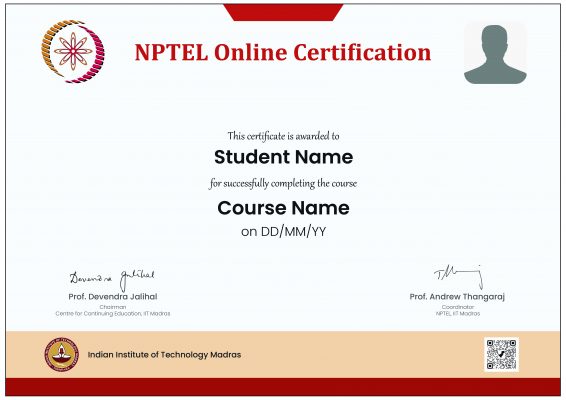Description
With the increased availability of data from varied sources there has been increasing attention paid to the various data driven disciplines such as analytics and machine learning. In this course we intend to introduce some of the basic concepts of machine learning from a mathematically well motivated perspective. We will cover the different learning paradigms and some of the more popular algorithms and architectures used in each of these paradigms.
INTENDED AUDIENCE
This is an elective course. Intended for senior UG/PG students. BE/ME/MS/PhD
PREREQUISITES
We will assume that the students know programming for some of the assignments.If the students have done introductory courses on probability theory and linear algebra it would be helpful. We will review some of the basic topics in the first two weeks as well.
INDUSTRY SUPPORT
Any company in the data analytics/data science/big data domain would value this course.
ABOUT THE INSTRUCTOR

Prof. Balaraman Ravindran is currently an Professor in Computer Science at IIT Madras and Mindtree Faculty Fellow . He has nearly two decades of research experience in machine learning and specifically reinforcement learning. Currently his research interests are centered on learning from and through interactions and span the areas of data mining, social network analysis, and reinforcement learning.
Certification Process
1. Join the course
Learners may pay the applicable fees and enrol to a course on offer in the portal and get access to all of its contents including assignments. Validity of enrolment, which includes access to the videos and other learning material and attempting the assignments, will be mentioned on the course. Learner has to complete the assignments and get the minimum required marks to be eligible for the certification exam within this period.
COURSE ENROLMENT FEE: The Fee for Enrolment is Rs. 3000 + GST
2. Watch Videos+Submit Assignments
After enrolling, learners can watch lectures and learn and follow it up with attempting/answering the assignments given.
3. Get qualified to register for exams
A learner can earn a certificate in the self paced course only by appearing for the online remote proctored exam and to register for this, the learner should get minimum required marks in the assignments as given below:
CRITERIA TO GET A CERTIFICATE
Assignment score = Score more than 50% in at least 9/12 assignments.
Exam score = 50% of the proctored certification exam score out of 100
Only the e-certificate will be made available. Hard copies will not be dispatched."
4. Register for exams
The certification exam is conducted online with remote proctoring. Once a learner has become eligible to register for the certification exam, they can choose a slot convenient to them from what is available and pay the exam fee. Schedule of available slot dates/timings for these remote-proctored online examinations will be published and made available to the learners.
EXAM FEE: The remote proctoring exam is optional for a fee of Rs.1500 + GST. An additional fee of Rs.1500 will apply for a non-standard time slot.
5. Results and Certification
After the exam, based on the certification criteria of the course, results will be declared and learners will be notified of the same. A link to download the e-certificate will be shared with learners who pass the certification exam.
CERTIFICATE TEMPLATE

Course Details
Week 1: Introduction: Statistical Decision Theory - Regression, Classification, Bias Variance
Week 2: Linear Regression, Multivariate Regression, Subset Selection, Shrinkage Methods, Principal Component Regression, Partial Least squares
Week 3: Linear Classification, Logistic Regression, Linear Discriminant Analysis
Week 4: Perceptron, Support Vector Machines
Week 5: Neural Networks - Introduction, Early Models, Perceptron Learning, Backpropagation, Initialization, Training & Validation, Parameter Estimation - MLE, MAP, Bayesian Estimation
Week 6: Decision Trees, Regression Trees, Stopping Criterion & Pruning loss functions, Categorical Attributes, Multiway Splits, Missing Values, Decision Trees - Instability Evaluation Measures
Week 7: Bootstrapping & Cross Validation, Class Evaluation Measures, ROC curve, MDL, Ensemble Methods - Bagging, Committee Machines and Stacking, Boosting
Week 8: Gradient Boosting, Random Forests, Multi-class Classification, Naive Bayes, Bayesian Networks
Week 9: Undirected Graphical Models, HMM, Variable Elimination, Belief Propagation
Week 10: Partitional Clustering, Hierarchical Clustering, Birch Algorithm, CURE Algorithm, Density-based Clustering
Week 11: Gaussian Mixture Models, Expectation Maximization
Week 12: Learning Theory, Introduction to Reinforcement Learning, Optional videos (RL framework, TD learning, Solution Methods, Applications)
BOOKS AND REFERENCES:
- The Elements of Statistical Learning, by Trevor Hastie, Robert Tibshirani, Jerome H. Friedman (freely available online)
- Pattern Recognition and Machine Learning, by Christopher Bishop (optional)




biswajit –
this is a very good course.
CHETHAN MS –
Good